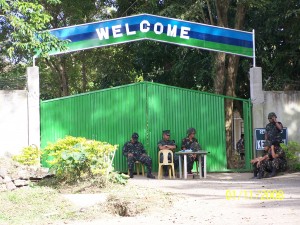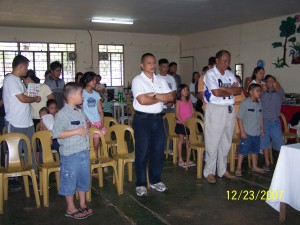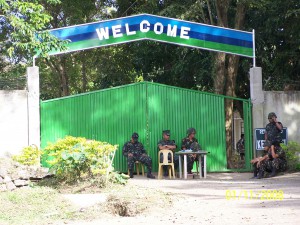By TESSA JAMANDRE
 TANAY, Rizal.—Some of the Armed Forces’ most promising officers spent years in detention here, inside a high-fenced, heavily guarded facility within Camp Capinpin, the isolated military outpost east of Metro Manila.
TANAY, Rizal.—Some of the Armed Forces’ most promising officers spent years in detention here, inside a high-fenced, heavily guarded facility within Camp Capinpin, the isolated military outpost east of Metro Manila.
The prison became the setting for some of the soldiers’ hardest and loneliest days, and it was also where they marked important family milestones, away from home.
Here, the soldiers’ wives and children crossed paths, many taking the weekend road trip together up the winding highways that led to Camp Capinpin. Christmas parties became reunions, and they shared birthdays and anniversaries.
At least six babies were born to the wives of officers while they were behind bars, while another one was born after the acquittal.
But there were also wives who lost babies in miscarriages. After many years of trying, Capt. William Upano’s wife finally got pregnant here, and they had their first baby. But she suffered a miscarriage and lost their second baby recently.
Capt. Montano Almodovar’s wife also had a miscarriage but an emergency leave from detention was some consolation, as it allowed him to be with his wife.
Maj. Jason Laureano Aquino was blessed with another baby just when his daughter was already in high school. Chez, now three years old, is still waiting for her dad to be set free.
 Lt. Col. Nestor Flordeliza, who is nearing retirement, can only be thankful for his first baby boy who turned a year old in the Tanay jail. But to Lt. Jacon Cordero, the best gift he will give his daughter on her first birthday on Aug. 25 is his presence as a free man. Capt. James Sabadan’s only daughter, born after he and his wife had had three boys, was christened Christmas day in Camp Capinpin. Capt. Frederick Sales, meanwhile, was finally free to see his third baby born after Christmas, the family’s first together in their own home without bars and guards.
Lt. Col. Nestor Flordeliza, who is nearing retirement, can only be thankful for his first baby boy who turned a year old in the Tanay jail. But to Lt. Jacon Cordero, the best gift he will give his daughter on her first birthday on Aug. 25 is his presence as a free man. Capt. James Sabadan’s only daughter, born after he and his wife had had three boys, was christened Christmas day in Camp Capinpin. Capt. Frederick Sales, meanwhile, was finally free to see his third baby born after Christmas, the family’s first together in their own home without bars and guards.
Amiel was born when his father, Lt. Ervin Divinagracia, was in jail. But Amiel soon lost his mother to leukemia during the course of his father’s trial. She died without seeing her husband acquitted.
The soldiers’ four-year-trial was marked with long periods of disbelief over the many attempts to railroad due process, and by walkouts by either defense or accused from court proceedings, as well as heated exchanges between prosecutors, defense and accused.
There were times that the detainees were bodily taken to court, or forcibly moved to other detention facilities, events that were met with resistance.
These challenges kept the group together until they were scattered to the different detention facilities. Some were kept in Tanay; the senior officers moved to Camp Aguinaldo.
Bickering and internal strife cracked the once united group. In an altercation in the premises of their detention in ISAFP, Aquino, a junior officer, filed charges of slight physical injuries against his senior, Col. Ariel Querubin, before a Quezon City court. While Querubin’s wife filed a complaint of Conduct Unbecoming of An Officer and a Gentleman before a Provost Marshall in Camp Aguinaldo last January 4, 2010 against Aquino.
The custodial center in Tanay is not the same anymore. Gone are the fathers who spent weekends helping their children with school work. Gone too is the tiny sari-sari store inside the jail that served as source of livelihood for some. The vegetables in the garden plots and tilapia in makeshift ponds have long been harvested, and there were no more chickens and ducks to roast after the detained officers-turned-farmers left.
As for the 12 who were acquitted, they are back in the service. Col. Januario Caringal has already held two posts after his acquittal. He was deputy commander of the anti-coup unit of the Marines, a post he held for three months before he turned it over to his classmate, Col. Armando Bañez. Bañez was the 12th officer to be acquitted only days after the 11 were cleared.
Caringal is now superintendent of the Marine Corps Training Center. A fellow Marine, Maj.Francisco Domingo Fernandez, is now deputy commander for operations and, as if making up for the lost time, is concurrently the Marines’ officer for education and training.
Capt. Ruben Guinolbay, known for his daring feat in the June 2001 seige of Lamitan town in Basilan when he led a handful of his men in pursuit of fleeing Abu Sayyaf bandits, is back in the one place he excels in: the battleground. He is now with Army’s 6th Infantry Division in Maguindanao together with Lt. Sandro Sereno.
Meanwhile, Sales and Divinagracia were brought closer to their home province after being assigned with the 54th Engineering Brigade in Pangasinan and 552nd Engineer Construction Battalion in Dingle, Iloilo, respectively.
Capt. Allan C. Aurino is still recovering from an illness and grief over his mother’s death recently. He is yet to get his assignment orders. Flordeliza’s retirement from the service after his acquittal was an opportune time to help in the senatorial campaign of Brig. Gen. Danilo Lim.
Cordero and Lt. Richiemel Caballes no longer sell the cheese pimiento spread they used to make while in detention in Tanay. They are now with the Army’s Security and Escort Battalion. Cordero served as a foyer guard at the Batasan Pambansa during President Benigno Aquino III’s State of the nation Address. For this Scout Ranger trained as a member of the Army’s elite force, this ceremonial tasking was one historic feat.
While it took some time for them to be posted, adjusting and reintegration had not been a problem. Looking back, Caringal said the incarceration reunited him with his family, and transformed him from the stranger that he was to his wife and children. “Before I made it clear to my wife, that my career was my priority, I was that mean,” Caringal said. But now he said, he knew his family better because they held on to him when he was at the lowest point of his career.
For Guinolbay’s six-year-old son Renzo, his father’s acquittal meant that the inexplicably long Army training that his father went through had finally ended. Renzo was led to believe that his dad was just on training.
Attending court martial hearings, Renzo presumed that the military judges were teachers, because the court looked like a classroom minus the blackboard with the 28 accused sitting across the room facing the panel with the prosecution and defense panels on opposite sides of the room. It was hard for Guinolbay to explain to his son that he was all along detained in what is supposed to be a training camp of the Scout Rangers in Tanay.
